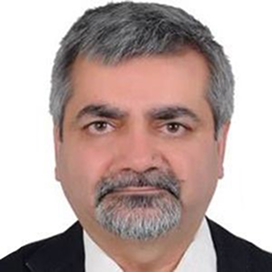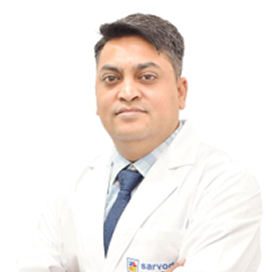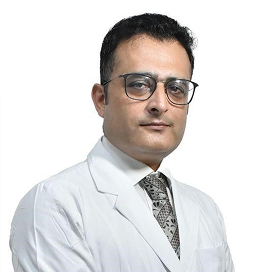Cranioplasty Treatment
Cranioplasty is a surgical procedure performed to repair or reconstruct defects in the skull. These defects can result from trauma, previous surgeries, congenital conditions, or infections. The surgery improves the skull's structure, restores aesthetics, and provides brain protection.
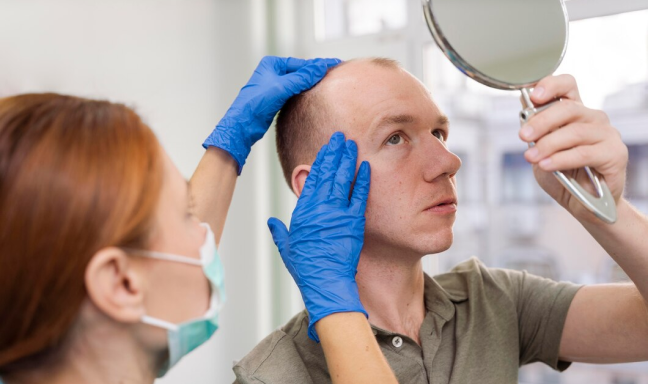
Types of Cranioplasty
1. Autologous Cranioplasty
-
Uses the patient's own bone flap, typically preserved after initial surgery.
-
Ideal for patients with minimal risk of bone infection or resorption.
2. Alloplastic Cranioplasty
-
Involves the use of synthetic materials such as titanium, acrylic (PMMA), or polyethylene implants.
-
These materials are durable, customizable, and particularly useful in cases where the original bone cannot be used.
3. Custom Cranioplasty
-
Uses 3D-printed implants tailored to the patient's skull anatomy.
-
Provides a precise fit and excellent cosmetic outcomes.
Who Needs Cranioplasty?
Cranioplasty is recommended for patients with:
-
Skull defects due to trauma or accidents.
-
Previous surgeries such as decompressive craniectomy.
-
Congenital skull defects.
-
Bone infections requiring removal of the affected skull portion.
-
Cosmetic concerns related to cranial deformities.
Investigations Required
Before the surgery, patients undergo detailed evaluations, which may include:
-
Imaging Tests: CT scans or MRIs to assess the defect and plan the procedure.
-
Blood Tests: To check for any underlying conditions or infections.
-
Medical History Review: To identify any contraindications or potential complications.
Line of Treatment
-
The surgical team prepares the implant (bone flap or synthetic material) based on the defect's size and shape.
-
General anesthesia is administered before the surgery.
-
The surgeon reopens the scalp incision to access the defect.
-
The prepared implant is carefully positioned over the defect and secured using plates, screws, or surgical adhesives.
-
The scalp is sutured back in place.
-
The surgeon reopens the scalp incision to access the defect.
1. Preparation
2. Surgical Procedure
3. Post-Surgery
Hospital Stay
The average hospital stay after a cranioplasty procedure is 3 to 7 days, depending on the patient's condition and recovery rate.
Success Rate
The success rate of cranioplasty is generally high, ranging from 85% to 95%. Factors contributing to success include the patient's overall health, the material used, and proper post-operative care.
Risks Associated with Cranioplasty
Although cranioplasty is considered a safe procedure, some risks include:
-
Infections: Particularly at the surgical site.
-
Hematoma or Blood Clots: May occur near the implant.
-
Implant Rejection: In rare cases, the body may reject synthetic materials.
-
Seizures: A possible but uncommon side effect.
-
CSF Leaks: Cerebrospinal fluid leakage due to improper sealing.
-
Neurological Complications: Temporary or permanent deficits due to surgical manipulation.
Post-Operative Care
-
Monitoring: Regular follow-ups with the surgeon to assess healing and implant integration.
-
Wound Care: Keep the surgical site clean and dry to prevent infections.
-
Medications: Pain relievers and antibiotics as prescribed.
-
Activity Restrictions: Avoid strenuous activities, bending, or lifting heavy objects for several weeks.
-
Diet: Follow a balanced diet to promote healing and overall recovery.
-
Signs to Watch: Report symptoms like fever, severe headache, swelling, or unusual discharge immediately.
Universelle Medicaid Cranioplasty Treatment in India
India is a leading destination for cranioplasty treatment due to its advanced medical facilities, skilled surgeons, and affordable costs. Universelle Medicaid ensures high-quality care with world-class hospitals and experienced neurosurgeons. The treatment cost remains economical, making it accessible for patients globally.
Cranioplasty Treatment Costs in India
| Treatment | Cost Start From ($) | Hospital Stay |
|---|---|---|
| Cranioplasty Procedure | 4000 - 6000 | 3 -7 Days |
| Brain Tumor Surgery | 5,000 - 7,000 | 5 - 10 Days |
| Decompressive Craniectomy | 3,500 - 5,000 | 5 - 7 Days |
Why Choose Universelle Medicaid?
-
Expertise: Board-certified neurosurgeons with extensive experience in cranioplasty.
-
Advanced Technology: Access to cutting-edge surgical techniques and materials.
-
Comprehensive Care: Dedicated support throughout pre- and post-operative stages.
-
Affordability: Cost-effective treatment options without compromising quality.
Contact Universelle Medicaid today to learn more about cranioplasty and other neurosurgical treatments in India.
Frequently Asked Questions(FAQ's)
Important Notes
-
Prices are subject to change or withdrawal with notice.
-
TThese are indicative prices, and they may vary depending on the patient's condition at the time of admission
-
A final estimate will be provided upon the patient’s admission.
With Universelle Medicaid, you'll have access to world-class medical care that can help restore your hearing, improve communication, and enhance your quality of life.
TREATMENTS
Neurosurgery treatment

Brain Tumor Removal Surgery
Brain tumor removal surgery involves the excision of abnormal growths in the brain...
More Information
Brain Tumor Removal Surgery
Brain tumor removal surgery involves the excision of abnormal growths in the brain...
More InformationDoctors
Our Specialist Doctors

Dr. Shashank Chaudhary
Surgical Oncology, Cancer Care


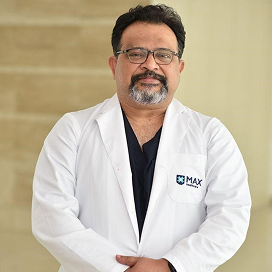
Dr. Vijayant Devenraj
Cardiac Surgery (CTVS), Thoracic



Dr. PrasoonKant Shamshery
Orthopaedics & Joint Replacement


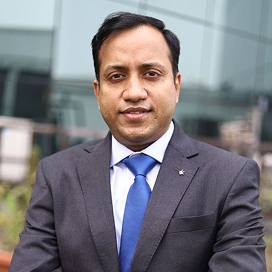
Dr. Vikas Singla
Senior Director & Head – Gastroenterology (Pancreatic-Biliary, Luminal Gastroenterology & Endoscopy Division)



Dr. Anita Sethi
Principal Director & HOD - Ophthalmology (Max Panchsheel & Max Saket)


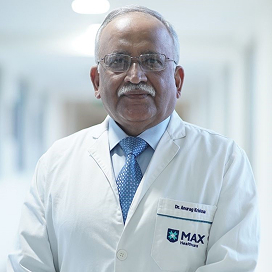
Dr. Anurag Krishna
Chairman - Paediatrics & Paediatric Surgery Paediatric (Ped) Surgery, Paediatric (Ped) Urology



Dr. Bipin Walia
Vice Chairman & Head- Neurosurgery for Max Saket Complex & Vice Chairman- Neurospine, Max Saket


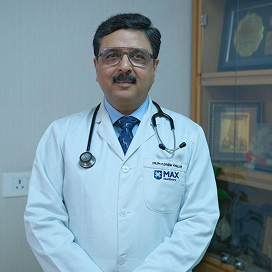
Dr. Dinesh Khullar
Chairman - Nephrology & Renal Transplant Medicine, Max Saket Complex


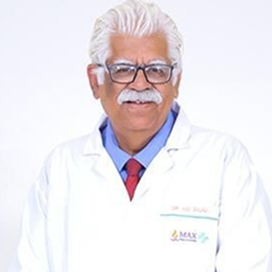
Dr. H.N. Bajaj
Principal Director (Orthopaedics) & Head (Spine Surgery) Orthopaedics & Joint Replacement, Spine Surgery, Arthroscopy & Sports Injury



Dr. Harit Chaturvedi
Chairman - Max Institute of Cancer Care Cancer Care / Oncology, Thoracic Oncology, Surgical Oncology, Robotic Surgery, Head & Neck Oncology, Breast Cancer



Dr. Kulbhushan Singh Dagar
Principal Director, Chief Surgeon & Head - Neonatal & Congenital Heart Surgery Paediatric (Ped) Cardiac Surgery, Cardiac Sciences, Paediatrics (Ped)


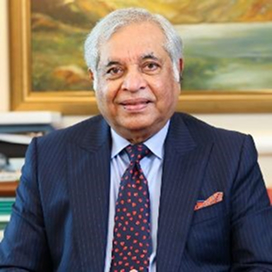
Dr. Pradeep Chowbey
Chairman - Max Institute of Laparoscopic, Endoscopic, Bariatric Surgery & Allied Surgical Specialities



Dr. Sunil Choudhary
Principal Director & Chief of Plastic Surgery (Max Institute of Reconstructive, Aesthetic, Cleft & Craniofacial Surgery (Miracles) Aesthetic And Reconstructive Surgery



Dr. Abhishek Mishra
MBBS, MS - Orthopaedics Orthopedic surgeon, Joint Replacement Surgeon


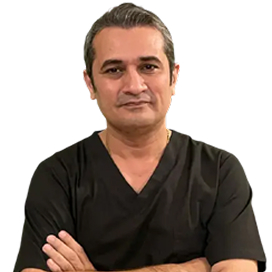
Dr. Vineet Malhotra
MBBS | MS – General Surgery | DNB – Urology/Genito – Urinary Surgery



Dr. (Lt Col) Ashok Kumar
Senior Consultant & Head - Radiation Oncology



Dr. Aman Jyoti
Senior Consultant – Paediatrics Cardiac Anaesthesia & Cardiac Intensive Care



Dr. Amit Kumar
Associate Director & Head (Unit I) - Interventional Cardiology



Dr. Anushtup De
Senior Consultant & Head (Unit l) - General & Minimally Invasive Surgery



Dr. Arjun Goel
Senior Consultant & Head (Unit II)- General & Minimally Invasive Surgery



Dr. Dinesh Pendharkar
HOD & Director - Medical Oncology, Cancer Care, Haematology & BMT



Dr. Subhash Hakoo
HOD & Director - General & Minimally Invasive Surgery



Dr. Sujoy Bhattacharjee
HOD & Director - Robotic Joint Replacement



Dr. Tanmay Pandya
HOD & Director - Nephrology & Renal Transplantation



Dr. Ved Prakash
Senior Consultant & Head - Cardiothoracic & Vascular Surgery



Dr. Anuj Agrawal
Sr. Consultant Department of Orthopaedics & Joint Replacement



Dr. Ashwini Kumar Singh
Senior Consultant & Head Plastic, Reconstructive & Cosmetic Surgery



Dr. Nikhil Gupta
Orthopaedics, Arthroscopy & Joint Replacement Surgery



Dr. Sparshi Jain
Consultant in Department of Ophthalmology



Dr. (Maj) Ravi Shankar
Consultant - Haemato-Oncology & BMT MBBS, MD (Pediatrics) Fellowship PHO & BMT



Dr. Amrita Tiwary Vyas
Consultant, Neurosciences/Neurosurgery, Brain & Spine Specialist



Dr. Ankit Agrawal
Consultant, Neurosciences/Neurosurgery, Brain & Spine Specialist



Dr. Sudhir Sharma
Director - Minimal Access, Robotic, Bariatric and General Surgery, MBBS, MS, MBA, FIAGES, FICLS



Dr. Sujoy Bhattacharjee
HOD & Director - Robotic Joint Replacement


Book Appointment
Complete the form below to schedule your appointment.
Begin Your Health Treatment Journey with Us
By utilizing our services, you'll find it easier to improve your well-being and feel better."
Consult Now








